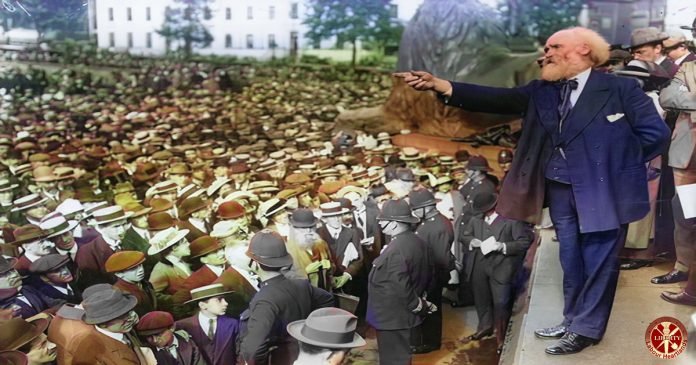
The foundations of the Labour Party were laid by the working class, on its cornerstone chiselled deeply in bold letters is the word ‘socialism’.
It really doesn’t matter how hard the present Labour Party under the tenure of Sir Keir Starmer try to shove the Left-wing down the proverbial memory hole, Starmer and his regime won’t last forever, in fact, the sooner it sinks with the weight of its own treachery and hypocrisy the better.
The Labour Party after over 120 years has become little more than a poor reflection of its founding ideology and its ambition to create a world that reflects some sort of fairness and equality, its dream of emancipation of the working class has been forgotten. The denial of its Left-wing socialist ideals has left Starmer able to rebrand the Labour Party to reflect his own right-wing worldview.
His attacks on grassroots democracy have left little doubt his drive is to bring about the kind none participation his fellow Trilateral Commission members have been enforcing on political organisations, universities and even unions around the world since the late 60s.
It is that kind of infiltration by external organisations and lobbyists that has influenced politics to remain slave to the establishment and the status quo.
None of this is new, throughout the struggle for emancipation the working class has continually faced treachery and disappointment from those we elect to represent our views.
As the nineteenth century came to a close, working-class representation in political office became a great concern for many Britons. Many who sought the election of working men and their advocates to the Parliament of the United Kingdom saw the Liberal Party as the main vehicle for achieving this aim. As early as 1869, a Labour Representation League had been established to register and mobilise working-class voters on behalf of favoured Liberal candidates.
Many trade unions themselves became concerned with gaining parliamentary representation to advance their legislative aims. From the 1870s a series of working-class candidates financially supported by trade unions were accepted and supported by the Liberal Party. The federation of British unions, the Trades Union Congress (TUC), formed its own electoral committee in 1886 to further advance its electoral goals.
Many socialist intellectuals, particularly those influenced by Christian socialism and similar notions of the ethical need for a restructuring of society, also saw the Liberals as the most obvious means for obtaining working-class representation. Within two years of its foundation in 1884, the gradualist Fabian Society officially committed itself to a policy of permeation of the Liberal Party.
The idea of working with the middle-class Liberal Party to achieve working-class representation in parliament was not universally accepted, however. Marxist socialists, believing in the inevitability of class struggle between the working class and the capitalist class, rejected the idea of workers making common cause with the petty bourgeois Liberals in exchange for scraps of charity from the legislative table. The orthodox British Marxists established their own party, the Social Democratic Federation (SDF) in 1881.
Other socialist intellectuals, despite not sharing the concept of class struggle were nonetheless frustrated with the ideology and institutions of the Liberal Party and the secondary priority which it appeared to give to its working-class candidates. Out of these ideas and activities came a new generation of activists, including Keir Hardie, a Scot who had become convinced of the need for independent labour politics while working as a Gladstonian Liberal and trade union organiser in the Lanarkshire coalfield. Working with SDF members such as Henry Hyde Champion and Tom Mann he was instrumental in the foundation of the Scottish Labour Party in 1888.
It was this distinct lack of working-class representation that led to the forming of the Independent Labour party. Over 120 years later the Labour Party again lacks in working-class representation with a majority of its MPs being Bankers, barristers and lawyers. However, once the shackles were lifted from the uneasy alliance of the Libreal party the working class representatives like Keir Hardie showed their metal…
James Keir Hardie

James Keir Hardie (15 August 1856 – 26 September 1915) was a Scottish trade unionist and politician. He was a founder of the Labour Party, and served as its first parliamentary leader from 1906 to 1908.
Hardie was born in Newhouse, Lanarkshire. He started working at the age of seven, and from the age of 10 worked in the Lanarkshire coal mines. With a background in preaching, he became known as a talented public speaker and was chosen as a spokesman for his fellow miners. In 1879, Hardie was elected leader of a miners’ union in Hamilton and organised a National Conference of Miners in Dunfermline. He subsequently led miners’ strikes in Lanarkshire (1880) and Ayrshire (1881). He turned to journalism to make ends meet, and from 1886 was a full-time union organiser as secretary of the Ayrshire Miners’ Union.
Hardie initially supported William Gladstone‘s Liberal Party, but later concluded that the working class needed its own party. He first stood for parliament in 1888 as an independent, and later that year helped form the Scottish Labour Party. Hardie won the English seat of West Ham South as an independent candidate in 1892, and helped to form the Independent Labour Party (ILP) the following year. He lost his seat in 1895, but was re-elected to Parliament in 1900 for Merthyr Tydfil in South Wales. In the same year he helped to form the union-based Labour Representation Committee, which was later renamed the Labour Party.
After the 1906 election, Hardie was chosen as the Labour Party’s first parliamentary leader. He resigned in 1908 in favour of Arthur Henderson, and spent his remaining years campaigning for causes such as women’s suffrage, self-rule for India, and opposition to World War I. He died in 1915 while attempting to organise a pacifist general strike. Hardie is seen as a key figure in the history of the Labour Party and has been the subject of multiple biographies. Kenneth O. Morgan has called him “Labour’s greatest pioneer and its greatest hero”.
The Labour Party’s foundations were based on liberty equality and yes, socialism. It seems under the current leader Sir Keir Starmer, Labour has forgotten its past, only to become enthralled by market forces. Now, its PLP and the very machinery of the Party have capitulated entity to a capitalist system becoming little more than advocates of the Oligarchy their motto is to repeat Thatcher and cry There Is No Alternative! or TINA for short.
Any mention of socialism is taboo. If Kier Hardie lived today for the sheer audacity of such a speech as the one below he may well have found himself expelled or like the former Labour leader Jeremy Corbyn, he could at least have expected to have the whip removed for daring to challenge the status quo.
Keir Hardie: ‘Socialism proposes to dethrone the brute god Mammon”, House of Commons speech – 1901
1901, House of Commons, London, England.
Keir Hardie became the first leader of the British Labour Party.
I make no apology for bringing the question of Socialism before the House of Commons. It has long commanded the attention of the best minds in the country. It is a growing force in the thought of the world, and whether men agree or disagree with it, they have to reckon with it, and may as well begin by understanding it.
I begin by pointing out that the growth of our national wealth, instead of bringing comfort to the masses of the people, is imposing additional burdens on them. We are told on highest authority that some 300 years ago to total wealth of the English nation was 100 millions sterling. At the beginning of the last century it had increased to 2,000 millions, and this year it is estimated to be 13,000 millions.
While our population during the last century increased three and a half times, the wealth of the community increased over six times. But one factor in our national life remained with us all through the century, and is still with us, and that is that at the bottom of the social scale there is a mass of poverty and misery equal in magnitude to that which obtained one hundred years ago.
I submit that the true test of progress is not the accumulation of wealth in the hands of the few, but the elevation of the people as a whole. I admit frankly that considerable improvement was made in the condition of the working people during the last century. At the beginning of the 19th century the nation industrially was sick almost unto death. It was at that time passing from the old system of handy craft – under which every man was his own employer and his own capitalist, and traded directly with his customer – to the factory system which the introduction of machinery brought into existence.
During these 100 years the wealth of the nation accumulated and the condition of the working classes as compared with the early years of the century improved, but I respectfully submit to the House that there was more happiness, more comfort and more independence before machinery began to accumulate wealth.
The high standard of comfort and reached by the labouring classes at the end of the last century has not brought them that happiness which pertained in England three hundred years ago, when there was no machinery, no large capitalists, no private property in land, as we know it today, and when every person had the right to use the land for the purpose of producing food for himself and his family.
I said that improvement was made during the last century, but I would qualify that statement in this respect – that practically the whole of that improvement was made during the first 75 years.
During the last quarter of the century the condition of the working classes has been practically stationary. There have been slight increases of wages here and reductions of hours there, but the landlord with his increased rent has more than absorbed any advantage that may have been gained.
We are rapidly approaching the point when the nation will be called upon to decide between an uncontrolled monopoly conducted for the benefit and in the interests of its principal shareholders, and a monopoly owned, controlled and manipulated by the state in the interests of the nation as a whole.
I do not require to go far afield for arguments to support that part of my statement concerning the danger which the application of wealth in a few hands is bringing upon us. This House and the British nation know to their cost the danger which comes from allowing men to grow rich and permitting them to use their wealth to corrupt the press, to silence the pulpit, to degrade our national life, and to bring reproach and shame upon a great people, in order that a few unscrupulous scoundrels might be able to add to their ill-gotten gains.
The war in South Africa is a millionaires’ war. The troubles in China are due to the desire of the capitalists to exploit the people of that country, as they would fain exploit the people of South Africa. Much of the jealousy and bad blood existing between this country and France is traceable to the fact that we went to war in Egypt to suppress a popular uprising, seeking freedom for the people, in order that the interests of our bondholders might be secured.
Socialism, by placing the land and the instruments of production in the hands of the community, eliminates only the idle, useless class at both ends of the scale. Half a million of the people of this country benefit by the present system; the remaining millions of toilers and businessmen do not.
The pursuit of wealth corrupts the manhood of men. We are called upon at the beginning of the 20th century to decide the question propounded in the Sermon on the Mount, as to whether we will worship God or Mammon.
The present day is a Mammon worshipping age. Socialism proposes to dethrone the brute god Mammon and to lift humanity into its place. I beg to submit, in this very imperfect fashion, the resolution on the paper, merely promising that the last has not been heard the Socialist movement either in the country or on the floor of this House, but that, just as sure as radicalism democratised the system of government politically in the last century, so will socialism democratise the country industrially during this century upon which we just entered.
Support Independent Journalism Today
Our unwavering dedication is to provide you with unbiased news, diverse perspectives, and insightful opinions. We're on a mission to ensure that those in positions of power are held accountable for their actions, but we can't do it alone. Labour Heartlands is primarily funded by me, Paul Knaggs, and by the generous contributions of readers like you. Your donations keep us going and help us uphold the principles of independent journalism. Join us in our quest for truth, transparency, and accountability – donate today and be a part of our mission!
Like everyone else, we're facing challenges, and we need your help to stay online and continue providing crucial journalism. Every contribution, no matter how small, goes a long way in helping us thrive. By becoming one of our donors, you become a vital part of our mission to uncover the truth and uphold the values of democracy.
While we maintain our independence from political affiliations, we stand united against corruption, injustice, and the erosion of free speech, truth, and democracy. We believe in the power of accurate information in a democracy, and we consider facts non-negotiable.
Your support, no matter the amount, can make a significant impact. Together, we can make a difference and continue our journey toward a more informed and just society.
Thank you for supporting Labour Heartlands











